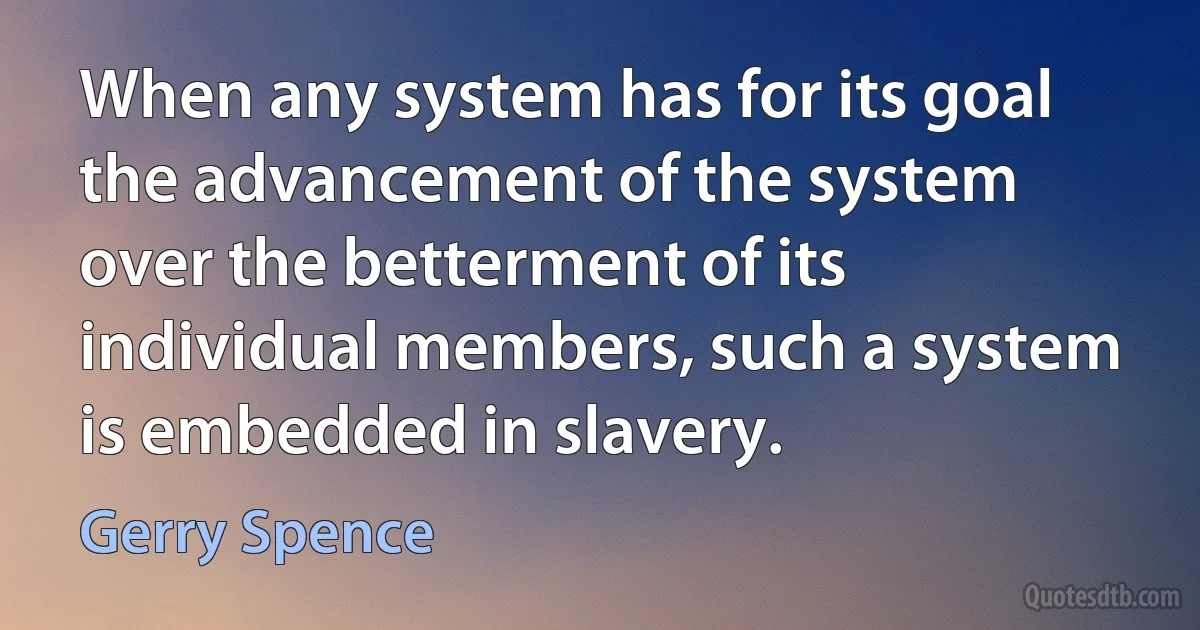System Quotes - page 100
This strengthens a belief which I have long cherished, that in a few centuries women will be the larger, stronger sex, admired for their biceps and superfluous hair, and that men will be their toys and domestic comforters, exciting tenderness in the female breast by their small feet, pretty soft hands, and general helplessness. I do not think I have a heart, for I have never been able to locate my pulse, or any other symptom of a circulatory system, but I am willing to share any of the benefits of male delicacy.

Robertson Davies
He was born into, and seems never to have questioned, that English "class system" which has been so much abused in the present century. Indeed, several governments have announced their intention of abolishing it, and the most recent prime minister to retire showed her egalitarian principles by accepting the title of Baroness Thatcher.

Robertson Davies
Under the old constitution, a secretary of the treasury for instance, had no opportunity, save by his annual reports, of presenting any scheme or plan of finance or other matter. He had no opportunity of explaining, expounding, enforcing, or defending his views of policy; his only resort was through the medium of an organ. In the British parliament, the premier brings in his budget and stands before the nation responsible for its every item. If it is indefensible, he falls before the attacks upon it, as he ought to. This will now be the case to a limited extent under our system. In the new constitution, provision has been made by which our heads of departments can speak for themselves and the administration, in behalf of its entire policy, without resorting to the indirect and highly objectionable medium of a newspaper. It is to be greatly hoped that under our system we shall never have what is known as a government organ.

Alexander H. Stephens
Allow me briefly to allude to some of these improvements. The question of building up class interests, or fostering one branch of industry to the prejudice of another under the exercise of the revenue power, which gave us so much trouble under the old constitution, is put at rest forever under the new. We allow the imposition of no duty with a view of giving advantage to one class of persons, in any trade or business, over those of another. All, under our system, stand upon the same broad principles of perfect equality. Honest labor and enterprise are left free and unrestricted in whatever pursuit they may be engaged. This old thorn of the tariff, which was the cause of so much irritation in the old body politic, is removed forever from the new.

Alexander H. Stephens
I shook my head ruefully. Police departments all over the world were identical in two respects: they all have a fondness for breaking your head open for little or no provocation, and they can't see the simple truth if it's lying in front of them naked with its legs spread. The police don't enforce laws; they don't even get busy until after the laws are broken. They solve crimes at a pitifully low rate of success. What the police are, to be honest, is a kind of secretarial pool that records the names of the victims and the statements of the witnesses. After enough time passes, they can safely shove this information to the back of the filing system to make room for more.

George Alec Effinger
"What do you know about the activities of the brain and the nervous system?”
I laughed. "About as much as any hustler from the Budayeen who can barely read and write his name. I know that the brain is in the head, I've heard that it's a bad idea to let some thug spill it on the sidewalk. Beyond that, I don't know much.” I did, truthfully, know some more, but I always hold something in reserve. It's a good policy to be a little quicker, a little stronger, and a little smarter than everybody thinks you are.

George Alec Effinger
Today there is a new class hostile to business in general, and especially to large corporations. As a group, you find them mainly in the very large and growing public sector and in the media. They share a disinterest in personal wealth, a dislike for the free-market economy, and a conviction that society may best be improved through greater governmental participation in the country's economic life. They are the media. They are the educational system. Their dislike for the free-market economy originates in their inability to exercise much influence over it so as to produce change. In its place they would prefer a system in which there is a very large political component. This is because the new class has a great deal of influence in politics. Thus, through politics, they can exercise a direct and immediate influence on the shape of our society and the direction of national affairs.

Irving Kristol
Christ's divinity accounts for His exaltation to the right hand of God, justifies the worship of angels and the confidence of mankind. It makes clear His right to the throne of the universe, and enables the mind to understand why He is exalted in providence, in grace, and in judgment. It is the unifying truth that harmonizes all other teachings of Christianity, and renders the entire system symmetrical and complete.

George C. Lorimer
Order is found in things working beneficially together. It is not the forced condition of neatness, tidiness, and straightness all of which are, in design or energy terms, disordered. True order may lie in apparent confusion; it is the acid test of entropic order to test the system for yield. If it consumes energy beyond product, it is in disoder. If it produces energy to or beyond consumption, it is ordered.

Bill Mollison
The wonderful thing about dynamic typing is it lets you express anything that is computable. And type systems don't - type systems are typically decidable, and they restrict you to a subset. People who favor static type systems say "it's fine, it's good enough; all the interesting programs you want to write will work as types”. But that's ridiculous - once you have a type system, you don't even know what interesting programs are there.

Gilad Bracha
Whereas many socialists have recently put their faith in market socialism, nineteenth-century socialists were, by contrast, for the most part opposed to market organization of economic life. The mainstream socialist pioneers favored something that they thought would be far superior, to wit, comprehensive central planning, which, it was hoped, could realize the socialist ideal of a truly sharing society. And the pioneers' successors were encouraged by what they interpreted as victories of planning, such as the industrialization of the Soviet Union and the early institution of educational and medical provision in the People's Republic of China. But central planning, at least as practiced in the past, is, we now know, a poor recipe for economic success, at any rate once a society has provided itself with the essentials of a modern productive system.

Gerald Cohen
Some of the surveillance was ostensibly devoted to terrorism suspects. But great quantities of the programs manifestly had nothing to do with national security. The documents left no doubt that the NSA was equally involved in economic espionage, diplomatic spying, and suspicionless surveillance aimed at entire populations. Taken in its entirety, the Snowden archive led to an ultimately simple conclusion: the US government had built a system that has as its goal the complete elimination of electronic privacy worldwide. Far from hyperbole, that is the literal, explicitly stated aim of the surveillance state: to collect, store, monitor, and analyze all electronic communication by all people around the globe.

Glenn Greenwald



